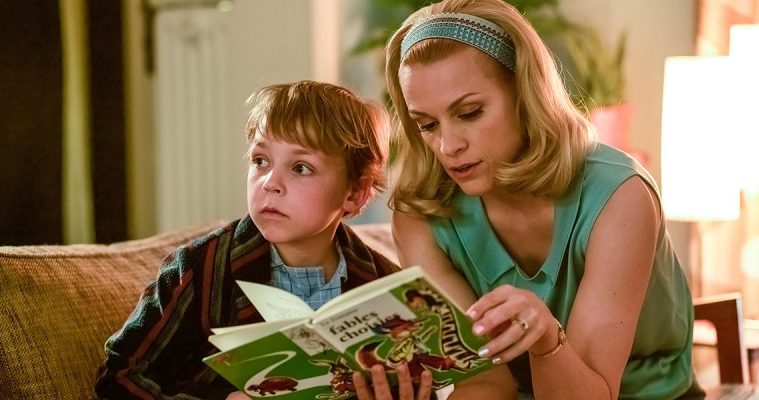Director Olivier Masset-Depasse lets us know exactly what to expect out of Duelles (Mothers’ Instinct) from the start, introducing an idyllic bourgeois home with all the sensory cues to foreshadow melodramatic suspense. Alice Brunelle (Veerle Baetens) peers out her window as neighbor Céline Geniot (Anne Coesens) leaves, rushes out once the car pulls away. She enters the woman’s adjoining home with a set of keys to clandestinely move through and close the curtains. We assume the worst: an affair. The music manipulates this suspenseful thought, the camera in-close to lend an anxiously frenetic tone to her movements. And then Céline returns, sensing something amiss. We brace for the reveal as Masset-Depasse provides it with a sly smile, simultaneously proving we got worked up for nothing and that we weren’t wrong to do so.
He and co-writers Giordano Gederlini and François Verjans wield these tools of sight and sound throughout the film, constantly presenting scenarios for which to increase our paranoia along with the characters onscreen. In truth Alice and Céline are practically sisters, their respective husbands (Mehdi Nebbou’s Simon and Arieh Worthalter’s Damien) and sons (Jules Lefebvres’ Theo and Luan Adam’s Maxime) sharing that same closeness together. The assumption is that they raised their kids in tandem, their doors and backyards forever open for free movement and familial connection. They trust one another implicitly as shoulders to lean on and empathetic souls to understand the heightened emotions upper middle class Belgium of the 1960s supplies. Inevitable tragedy, however, exposes the cracks human nature lets form regardless.

A death occurs—an accident wherein blame is manifested by proximity rather than intent. Maxime was hanging precariously out his second-story window, Céline nowhere in sight and Alice too far to do anything but yell and run around the front to get into the Geniots’ home. Why did Céline leave him alone in that room? Could Alice have done more? These are questions we ask as outsiders viewing with a mind to figure out what might come next and questions the characters should ask out of sheer guilt. The closeness demonstrated throughout the film to this point works to have us wondering if they’d ask at all knowing neither would ever intentionally neglect their children. But they do anyway and not out of guilt despite what they say aloud. They do so out of rage and fear.
Where did it come from? Masset-Depasse isn’t interested in making this answer specific. Instead we pull our own together out of the environment. We project the sort of Revolutionary Road housewife malaise upon them with the slightest bit of drama proving astronomical in an otherwise drama-less vacuum. Alice and Céline don’t know what to do next. They don’t know how to react to this tragedy because none of us do. So they try and provide comfort in false equivalents of understanding. They win back trust on the surface only to discover how quickly it can be erased when something innocuous, circumstantial, or blatantly coincidental reinvigorates what is now a deep psychological wound. And madness soon enters when the capacity for clear thinking is replaced by dark infatuation.

Masset-Depasse winds things so tightly in this goal that we can’t help but laugh at the absurdity of the women’s sinister hypotheses. We laugh whenever something unexplained happens because we know the wheels will spin to make it a test of fidelity or precursor for revenge. They grow rabid to the point of violence, every episode followed by apologies and hugs that will never wipe the slate clean. We’re in the middle of a powder keg ready to explode and our only fear is that the filmmakers will pull back on the throttle. To revel in innuendo and speculation so long—always letting out a breath when the inevitable explosion is postponed one more time—and not receive the payoff would be devastating. Without giving anything away, I’ll just say that Mothers’ Instinct doesn’t disappoint.
With great soapy melodrama and just barely over-the-top performances to sell the intentionally intrusive score, we find ourselves at the edge of our seats and salivating for carnage. We crave that sadism to the point of being sad whenever the tension is held long enough to postpone the inevitable, but this only makes the impact of the actual moment hit harder with a welcome release of that anticipation. Things may at times inch a bit too close to “hysteric” range in a bad, stereotypical way of reducing the title’s instinct to embellished paranoia, but the filmmakers toe that line for entertainment rather than commentary. The film is a pulpy take in this way because these women ultimately aren’t crazy—at least not in that way and not by the end. There’s a real threat at work whether it exists because of or despite these reactionary motives.
Duelles (Mothers’ Instinct) screened at the Toronto International Film Festival.

